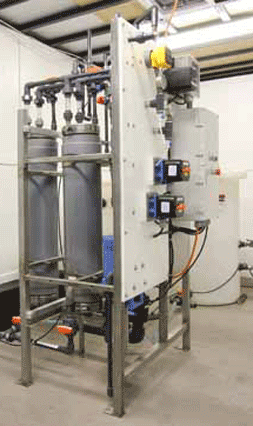The same compact membrane filtration process that has successfully provided safe drinking water in remote locations for over 15 years is now available in a new smaller configuration. The new Mini-Fyne® systems are ideal for remotely located schools, campgrounds and mining and oil services camps, where small volumes of drinking water are needed but only poor surface water sources are available.
Like the larger Fyne units before it, the Mini-Fyne® unit uses tubular nanofiltration membranes to clean surface water by removing dissolved organic materials (mostly humic and fulvic acids) that, after chlorination, produce undesired disinfection by-products like trihalomethanes and haloacetic acid. The process also reduces the level of iron and other metals in the water, while also holding back waterborne pathogens, microbes and viruses. The end result is safe colorless water that meets the requirements of the EPA Disinfectant/Disinfection By-Products Rule and the highest standards of filtration required by the EPA’s Long Term 2 Enhanced Surface Water Treatment Rule (LT2ESWTR).
The Mini-Fyne system is easy to install and operates unattended on single-phase power. It is easy to operate and features automated “foam-ball” cleaning so that it requires almost no maintenance. Operators simply need to top-off the chlorine tank weekly and wash the membranes every three months in order to keep the unit in good working order. The Mini-Fyne® system is available in four different sizes designed to filter as little as 240 or as much as 2500 gallons/day (900 to 9500 liters/day).
Membrane Specialists LLC supplies a full range of membrane equipment and process-development services to clients in the industrial, biofuels/bioproducts, food & beverage, nutraceuticals and water-treatment markets. The firm develops customized process solutions using microfiltration, ultrafiltration, nanofiltration and reverse osmosis and all available membrane geometries including polymeric tubular, spiral-wound and hollow-fiber membranes, as well as inorganic ceramic and stainless-steel membranes. This unbiased approach to crossflow membrane selection ensures a truly independent solution for each application.

